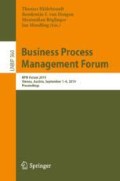Abstract
Business process mining algorithms discover processes from event logs that record sequences of events or actions. Typical event logs may or may not contain information about the attributes of the actions, such as the particular workstations used to carry out an action or the identity of the person performing the action. In this paper, we test the effect of action attributes on action sequence using data from electronic medical records at five dermatology clinics. We demonstrate that action sequence is influenced by attributes such as actors (who does what) and workstations (what is done where) that are not typically considered relevant to process flow control. We introduce a new metric – attribute alignment – that summarizes the extent to which actions are carried out with the same attributes throughout a process instance. If each action is always performed with the same attributes, attribute alignment is 100%. We discuss the implications and limitations of this finding for research and practice.
This material is based upon work supported by the National Science Foundation under Grant No. SES-1734237. Any opinions, findings, and conclusions or recommendations expressed in this material are those of the author(s) and do not necessarily reflect the views of the National Science Foundation. This research was also supported in part by University of Rochester CTSA (UL1 TR002001) from the National Center for Advancing Translational Sciences (NCATS) of the National Institutes of Health (NIH). The content is solely the responsibility of the authors and does not necessarily represent the official views of the National Institutes of Health. We are grateful for comments from Jan Recker and Jan Mendling on an early version of the analysis.
Access this chapter
Tax calculation will be finalised at checkout
Purchases are for personal use only
References
Van Der Aalst, W.: Process Mining: Discovery, Conformance and Enhancement of Business Processes. Springer, Heidelberg (2011). https://doi.org/10.1007/978-3-642-19345-3
Breuker, D., Matzner, M., Delfmann, P., Becker, J.: Comprehensible predictive models for business processes. MIS Q. 40, 1009–1034 (2016)
Dumas, M., La Rosa, M., Mendling, J., Reijers, H.A.: Fundamentals of Business Process Management. Springer, Heidelberg (2013). https://doi.org/10.1007/978-3-642-33143-5
Van der Aalst, W., Weijters, T., Maruster, L.: Workflow mining: discovering process models from event logs. IEEE Trans. Knowl. Data Eng. 16, 1128–1142 (2004)
Acampora, G., Vitiello, A., Di Stefano, B., Van Der Aalst, W., Gunther, C., Verbeek, E.: IEEE 1849: the XES standard: the second IEEE standard sponsored by IEEE computational intelligence society [society briefs]. IEEE Comput. Intell. Mag. 12, 4–8 (2017)
van der Aalst, W., et al.: Process mining manifesto. In: Daniel, F., Barkaoui, K., Dustdar, S. (eds.) BPM 2011. LNBIP, vol. 99, pp. 169–194. Springer, Heidelberg (2012). https://doi.org/10.1007/978-3-642-28108-2_19
Rosemann, M., Recker, J.C.: Context-aware process design: exploring the extrinsic drivers for process flexibility. In: The 18th International Conference on Advanced Information Systems Engineering. Proceedings of Workshops and Doctoral Consortium, pp. 149–158. Namur University Press (2006)
Günther, C.W., Rinderle-Ma, S., Reichert, M., Van Der Aalst, W.M., Recker, J.: Using process mining to learn from process changes in evolutionary systems. Int. J. Bus. Process Integr. Manag. Spec. Issue Bus. Process Flex. 3, 61–78 (2008)
Rosemann, M., Recker, J.C., Flender, C.: Contextualisation of business processes. Int. J. Bus. Process Integr. Manag. 3, 47–60 (2008)
Bose, R.J.C., Van der Aalst, W.M.: Context aware trace clustering: towards improving process mining results. In: Proceedings of the Ninth SIAM International Conference on Data Mining, pp. 401–412. SIAM (2009)
Van Der Aalst, W.M., Dustdar, S.: Process mining put into context. IEEE Internet Comput. 16, 82–86 (2012)
Anastassiu, M., Santoro, F.M., Recker, J., Rosemann, M.: The quest for organizational flexibility: driving changes in business processes through the identification of relevant context. Bus. Process Manag. J. 22, 763–790 (2016)
Wood, R.E.: Task complexity: definition of the construct. Organ. Behav. Hum. Decis. Process. 37, 60–82 (1986)
Campbell, D.J.: Task complexity: a review and analysis. Acad. Manag. Rev. 13, 40–52 (1988)
Hackman, J.R.: Toward understanding the role of tasks in behavioral research. Acta Physiol. 31, 97–128 (1969)
Austin, J.L.: How to Do Things with Words. Oxford University Press, Oxford (1975)
Searle, J.R., Searle, J.R.: Speech Acts: An Essay in the Philosophy of Language. Cambridge University Press, Cambridge (1969)
Suchman, L.A.: Plans and Situated Actions: The Problem of Human-Machine Communication. Cambridge University Press, Cambridge (1987)
Feldman, M., Orlikowski, W.: Theorizing practice and practicing theory. Organ. Sci. 22, 1–14 (2011)
Hærem, T., Pentland, B.T., Miller, K.D.: Task complexity: extending a core concept. Acad. Manag. Rev. 40, 446–460 (2015)
Pentland, B.T., Recker, J., Wyner, G.: Rediscovering handoffs. Acad. Manag. Discov. 3, 284–301 (2017)
Pentland, B., Recker, J., Kim, I.: Capturing reality in flight? Empirical tools for strong process theory. In: Proceedings of Thirty Eighth International Conference on Information Systems, pp. 1–12 (2017)
Ryan, J.L., Xie, Y., Kim, I., Frank, K., Pentland, A.P., Pentland, B.T.: Team documentation influences clinic complexity and patient satisfaction. J. Invest. Dermatol. 139(5), S106 (2019)
Author information
Authors and Affiliations
Corresponding author
Editor information
Editors and Affiliations
Rights and permissions
Copyright information
© 2019 Springer Nature Switzerland AG
About this paper
Cite this paper
Kim, I., Pentland, B.T., Wolf, J.R., Xie, Y., Frank, K., Pentland, A.P. (2019). Effect of Attribute Alignment on Action Sequence Variability: Evidence from Electronic Medical Records. In: Hildebrandt, T., van Dongen, B., Röglinger, M., Mendling, J. (eds) Business Process Management Forum. BPM 2019. Lecture Notes in Business Information Processing, vol 360. Springer, Cham. https://doi.org/10.1007/978-3-030-26643-1_11
Download citation
DOI: https://doi.org/10.1007/978-3-030-26643-1_11
Published:
Publisher Name: Springer, Cham
Print ISBN: 978-3-030-26642-4
Online ISBN: 978-3-030-26643-1
eBook Packages: Computer ScienceComputer Science (R0)

